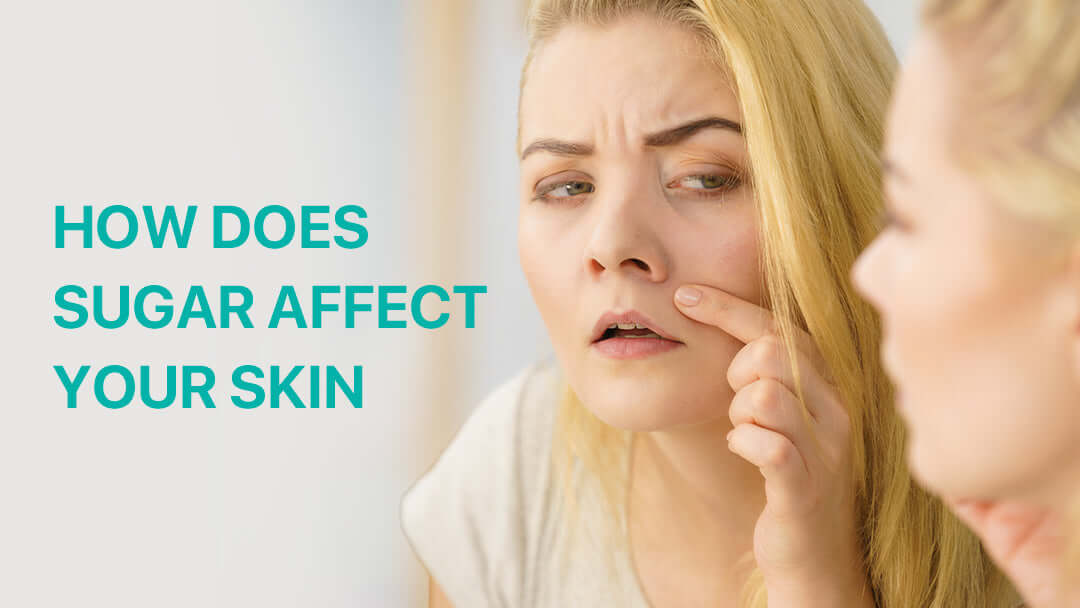We’ve long known that excessive sugar consumption is harmful to overall health, increasing risks for obesity, heart disease and diabetes. However, many fail to recognize sugar’s negative impacts beyond the body. Dermatological problems are among the top skin issues linked to diets high in refined sugars. Let’s explore how sugar wreaks havoc on skin when intake is poorly managed.
1. Acne Breakouts
Spiking glucose rapidly triggers insulin secretion, a hormone with pro-inflammatory properties. This inflammatory response, along with a boost of skin bacteria from excess sebum production, clogs pores and causes acne flare ups. Processed sugars lack nutrients to support skin health while taxing the liver which plays a vital exfoliating role.
2. Premature Aging Signs
Advanced glycation end products (AGEs) form when sugar molecules bond to proteins or fats without oxygen. This non-enzymatic glycation generates damaging free radicals over time, accelerating signs of photoaging like fine lines, uneven pigmentation and loss of elasticity. AGE accumulation may also suppress collagen synthesis for plumper, firmer skin.
3. Dull, Dehydrated Complexion
When glucose runs high too often, excess glucose pulls moisture from the outer layer of skin, leaving it dry and lackluster. Dehydrated skin lacks glow and appears uneven in texture with enlarged pores. Fluctuating glucose levels prevent optimal hydration at the cellular level.
Protecting Your Skin with Healthy Habits
To mitigate the negative effects of sugar on your skin, adopting a balanced diet and lifestyle is crucial. Incorporate plenty of fresh fruits and vegetables, lean proteins, and whole grains into your meals while minimizing processed foods and sugary snacks. Hydration is also essential for maintaining skin elasticity and flushing out toxins, so aim to drink plenty of water throughout the day.
Regular exercise not only helps regulate glucose levels but also promotes circulation, delivering vital nutrients to the skin and promoting a healthy glow. Adequate sleep is another vital factor in skin health, as it allows the body to repair and regenerate cells overnight. Additionally, managing stress through relaxation techniques such as meditation, yoga, or deep breathing exercises can prevent stress-induced skin flare-ups.
Monitor Sugar Intake with Continuous Glucose Monitor
To best combat sugar-induced dermatological issues, monitor glucose levels precisely with SIBIONICS GS1 Continuous Glucose Monitoring (CGM) System. Via its seamless wireless sensor, the SIBIONICS CGM delivers interstitial fluid glucose readings every 5 minutes in real-time for 14 days.
Unlike finger prick tests, its 24/7 tracking picks up all glycemic variations to support informed lifestyle tweaks keeping glucose stable. Understanding implications on skin prompts proactivity against breakouts, aging signs and dehydration through nutritional diet, exercise and other self-care strategies.
Additional natural remedies for reversing sugar-damaged skin involve restorative ingredients like antioxidants, omega-3s, probiotics and hydrating plant extracts. Limiting simple carbs and processed foods while incorporating whole, complex carbohydrates from vegetables, ancient grains and legumes aids complexion health when paired with diligent glucose tracking.
Conclusion
As we've explored, the relationship between sugar and skin health is undeniable, with excessive sugar consumption contributing to premature aging and skin conditions. However, by adopting healthy habits and continuous glucose monitoring, individuals can take proactive steps towards maintaining radiant, youthful skin. With the SIBIONICS GS1 CGM and its accompanying app, managing glucose levels become convenient and empowering, ultimately leading to improved skin health and overall wellness.
FAQs
Q: Will I look younger if I stop eating sugar?
A: Eliminating excess added sugars can help slow signs of aging by reducing glycation and oxidative stress on skin. Quitting sugar won't reverse the clocks but may impart a more radiant, youthful appearance over time.
Q: How long after quitting sugar will my skin improve?
A: Most notice improvements in 2-3 months as the body detoxifies and skin cells turn over, but full effects on collagen and elastin can take 6-12 months. Individual factors influence your skin's response time.
Q: What does a "Sugar face" look like?
A: "Sugar face" is a term used to describe potential effects of excessive sugar consumption on the skin. Common signs include acne breakouts, uneven tone/texture, fine lines/wrinkles, dullness/dehydration, enlarged pores and inflammation like puffiness. Sugar consumption exacerbates existing skin conditions too.
Q: Does sugar destroy collagen?
A: High sugar intake can indirectly impact collagen production and contribute to collagen degradation. Sugar molecules can attach to proteins in the body through a process called glycation, leading to the formation of harmful compounds called advanced glycation end products (AGEs). These AGEs can damage collagen fibers, potentially contributing to skin aging and other health issues.
Q: What are the signs of too much sugar intake?
A: Signs of excessive sugar intake can include weight gain, fatigue, frequent hunger or cravings, mood swings, dental problems, skin issues such as acne or dullness, and an increased risk of chronic diseases like type 2 diabetes and heart disease. Monitoring sugar consumption and paying attention to how your body responds can help identify if you're consuming too much sugar.
SIBIONICS GS1 Córas Monatóireachta Glúcóis CGM-Leanúnach

25.900 Ft
Monatóireacht Leanúnach Glúcóis 14-Lá Léamha Braiteoirí an-chruinn Tuarascálacha AGP is féidir a onnmhairiú Sonraí Glúcóis Fíor-Ama Inroinnte Aláram Glúcóis Inoiriúnaithe App éasca le húsáid Calabrú saor in aisce, Gan Scanadh IP28 uiscedhíonach … read more









